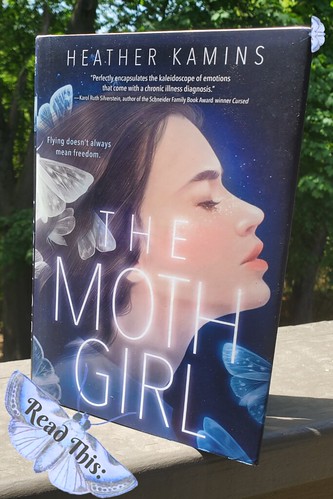Read This: The Moth Girl
The world needs more books like this!
I recently read an extraordinary new YA novel, entitled The Moth Girl, written by Heather Kamins. Why do I make such a bold statement?

This book is an important (and rare) read, in that the main character has a chronic illness. As someone who *has* a chronic illness, I am elated that this book was written. While the world is ever expanding resources for diversity (oh so important!), that often excludes disability.
The Moth Girl is the quintessential YA novel, one where hope springs eternal. I love that about this genre...that no matter the insurmountable problems, there is hope, and growth. Such is the case with Anna, who is surprised by, grows into, and learns to live with her chronic illness.
I absolutely LOVED this book. The characters are relatable, the story is both compelling and well-written, and there is much to learn from someone's physical and mental journey through acquired disabilities (ask me, I wrote my dissertation on it!).
Highly, highly recommended.
Heather Kamins is the recipient of an Artist Fellowship from the Massachusetts Cultural Council, and her short fiction has appeared in Guernica and elsewhere. The Moth Girl is her first novel. She lives in Western Massachusetts with her husband, two cats, and the variety of woodland creatures who stroll through her yard.
We were lucky enough to chat with Kamins about her book, inspiration, and more. Here's what she had to say...

Please tell us about your new book, The Moth Girl...
The Moth Girl follows 15-year-old Anna, an average high school sophomore who begins to feel mysterious aches and pains. One day at cross-country running practice, she faints, but instead of falling down, she falls up, floating a few feet off the ground. This turns out to be one of the symptoms of a strange chronic illness, which launches her into a new world of medical treatments and changes how she sees herself and how she interacts with others. It affects her friendships, her activities, and every other part of her life. So she has to figure out how to adapt to her new circumstances as well as who she is, and who she wants to be.
What inspired you to write this book?
When I was 14, I developed lupus, and like Anna, had to adapt to all the medical treatments and appointments that went with it—along with the ways it changed my identity and relationships. I didn't see a lot of stories about chronic illnesses back then. Most stories involving illness used it as a plot device, often to teach the other characters important lessons after the sick character either tragically died or made a miraculous recovery. I wanted to show a more realistic version of what living with a chronic illness can actually feel like for a teenager. Ironically, using a magical made-up illness helped me capture those very real feelings by showing how surreal and disorienting getting sick can be.
One of my favorite parts of the book was Anna's journey of self-discovery regarding her illness. What do you hope readers take from reading (and, perhaps resonating) with this?
I hope that readers who have health issues or other disabilities will feel seen, and that readers who don't will have a better understanding about what the experience can actually be like. It goes beyond illness, too. Anyone who's been through any kind of life-changing event—grief, addiction, trauma, etc.—may relate to how tough it is to feel understood by others, and how important it is to express yourself and to find people you can relate to who support you.
What were the joys and challenges of writing this book?
It took quite a bit of time to figure out what the story was, so there was a lot of rewriting involved. And getting a book published can be quite an emotional roller coaster, full of rejection but also really exciting moments when you find the people who connect with your work. In terms of the actual writing, I really enjoyed the worldbuilding element of making up the disease and everything that grew outward from it: medical specialties, treatments, and so forth. And of course the greatest joy for me is hearing from readers who enjoyed and resonated with the book!
How can readers find your work?
I'm on Instagram and occasionally Twitter as @shakieranthem. You can also visit my website at heatherkamins.com.
What's up next for you?
I'm almost done with a draft of another novel, this one about a murder and small town secrets, but again with a supernatural twist. I also write short stories, and I'm hoping to get a collection together at some point. Most of my work incorporates fantastical or sci-fi elements, so even though I'm interested in covering different kinds of topics, that's the common thread.
Is there anything else you'd like to share?
There are lots of great ways to support the writers you love, and buying your books from independent bookstores is at the top of the list. Doing things like leaving reviews online, requesting that your local library purchase books by authors you care about, and spreading the word about books you love are also wonderful—and free!




















